There’s lots going on in the front room this morning. Bags of soil and stacks of flower pots Vanessa and Carl are discussing whether the bulb planting activity they have planned for later should be out the back or on the pavement at the front. They agree they might attract more people if it’s at the front.
There’s a new member of staff in the kitchen given away by her Bolton at Home lanyard. I introduce myself to Hayley who, it turns out, is a debt advisor. I’ve only just written about Money Matters, the borough-wide debt advice service, and wonder why there’s another one. Seems places like Breightmet can’t get enough money advice.
We takes our mugs into one of the small offices upstairs and Hayley tells me their service, just 15 months old, was set up specifically to cope with the anticipated demand from their customers as the welfare reforms were rolled out. “Although we’re part of Bolton at Home, we’re impartial and we help our customers with all their debt issues.”
“So you’ve seen the direct effect of the cuts and the reforms? I suppose the bedroom tax is a big one?”
“Oh yes,” says Hayley. “People have had to make some serious decisions. Are they willing, or able, to downsize, or are they able to pay the extra from the money they have coming in? We can look at their expenditure on food and fuel to see if they can reduce that a little to free up some money to pay the under occupancy charge.”
“So your customers are having to spend less on food and fuel so they can afford the bedroom tax?”
“Yes, they are.”
“And in Bolton, is there enough housing stock of the right type to re-house customers?”
“That’s really not a question from me but realistically, no. If everybody who was under occupying, turned to us and said they were willing to move then no, we wouldn’t have enough of the right properties to move them to.”
“And then, on the other side of it, do you have an unmet demand from families who are waiting to take on those larger houses?”
“Again, I’m not the right person to answer that question but I suspect not. Ultimately this change is going to have the biggest impact on the customer, but also we as a housing organisation are affected because we’re going to have a lot of properties we’re unable to let.”
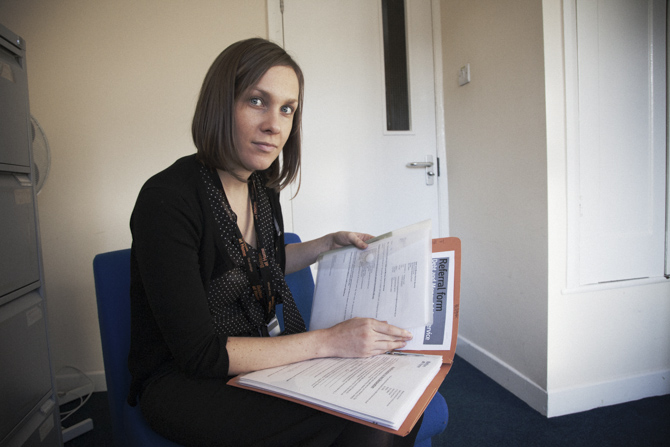
Thinking it must be soul-destroying listening to tales of unmanageable debt I ask Hayley what she gets out of it.
“For me, personally, I find debt advice very rewarding. As advisors – there are six on our team – we find a lot of customers don’t know the difference between priority and non-priority debt. They are making payments to non-priority debts well in excess of the amounts they should be paying.”
“I’m not sure either… what’s a priority debt?”
“One that has serious consequences if you don’t pay. So not paying the rent could lead to eviction, not paying council tax could lead to imprisonment. But the doorstep lender, who gets £20 each week because they come knocking on the door, can only threaten you with the bailiffs.
“The relief on people’s faces when you explain the difference and tell them you can work on their behalf to try and reduce or put on hold the non-priority debt, is very rewarding. We’ll write to the doorstep lender, explain the customer’s position, and that can really reduce the stress they are under.”
to be continued…
continued from Eating less to pay the extra ‘tax’
I’ve taken enough of Hayley’s time and decide to check out the bulb planting that I can hear is underway. A table from one of the small offices has been dragged outside into the bright sunshine. Carl and Alan – from Dave’s support group for substance misusers – are giving advice to a small group of enthusiastic residents.
“What are we doing with these then?” one woman asks, with a handful of tulip bulbs.
“Put a few in a pot,” says Alan, “and cover them over with the soil. Give them a drink of water when you get home.”
“I’ll give them a drink of sherry!” laughs the woman.
Another woman, coming out of the mini-mart next door, calls out to someone she knows: “What are you all doing?”
“We’re planting bulbs!” her friend shouts back. “Come and have a go.” And she does.
Karen is here too. She’s from a construction company working with Bolton at Home on the refurbishment of some houses on the estate. Apparently, they have donated all the necessary for today’s activity.
“So, you’re like a fairy godmother,” I suggest, “You can make these things happen?”
“Oh yes, I suppose I am,” she says, passing a bag of Iris Harmony down the table.
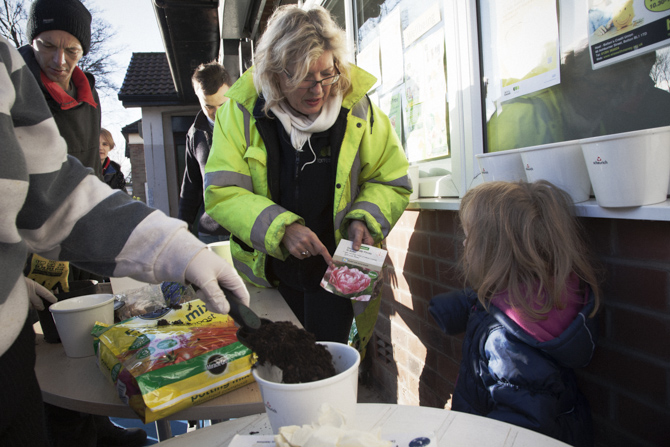
The UCAN is buzzing now, inside and out. Once they’ve planted a few bulbs in their tubs, the customers – almost exclusively women – gather inside where Rosanne is making brews and keeping the banter up. It’s billed as bulb planting but really it’s an opportunity to get to know customers better and continue building relationships.
Once all the pots are filled and the table is cleared away I ask Alan if he can show me the UCAN allotment. Over the last couple of months I’ve heard quite a bit about it and it’s seems appropriate after the bulb planting.
“Is it far?” I ask
“Only round the corner,” he says.
The allotment is pretty much on the next street. We’re down a path of sorts between two houses and then Alan unlocks a gate onto a piece of land bounded by about a dozen back gardens. At first glance it’s clear this allotment has seen better days.
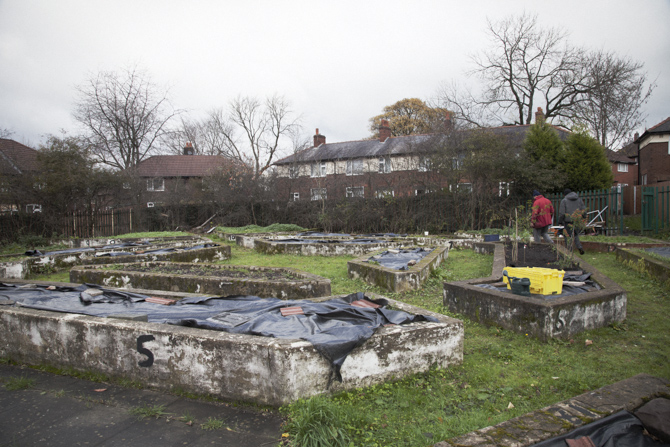
“No one knows it’s here, says Alan, sitting on the side of a cleared bed planting some tulip bulbs he’s brought. “I never knew myself until someone showed me… and I’ve lived round here for years. It’s hidden.”
“And what are you hoping to do with it?”
“I’ve been doing my plot for about eight months now, just keeping on top of it, keeping it going. But I want more from the community to get involved. I’ve tried to get other people interested but it’s hard.”
“You watch, though, as more of them see what you’ve done, then they’ll get interested. You’ll inspire them.”
“Maybe.”
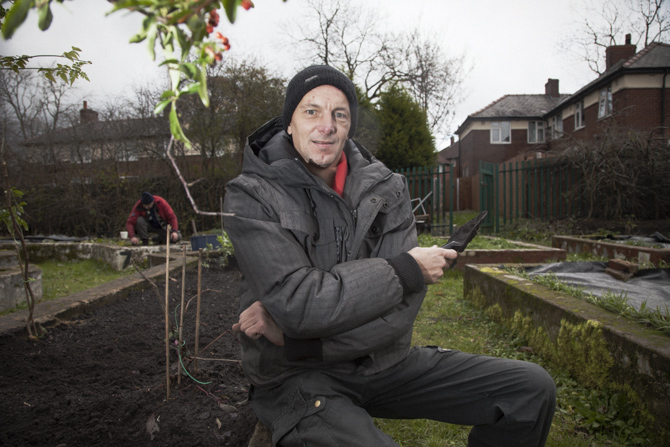
I know Alan is a regular with the support group for alcoholics and drug users and so, as fine rain starts to fall over the allotment, I tentatively ask about his involvement.
“My problem was alcohol,” he says, “but I’m fully recovered now. This sort of project is good for me. It keeps you going, keeps you ticking. Oh, I could to tell you loads of things. But I don’t want to get into that.” I don’t push it.
“So doing this and the UCAN,” – Alan also tends to the space at the back of the offices – “has been good for you?”
“It’s been fantastic for me. They’ve given me support, they’ve given me responsibilities. They’ve put their trust in me.”
The sun’s out again but the drizzle has yet to stop. “There’ll be a rainbow soon,” I say, scanning the sky above the neighbouring rooftops. “And what have you grown on here so far?”
“I’m doing flowers down this end,” says Alan, “and veg done there. I’ve already had some running beans and tried sweetcorn but that died off.”
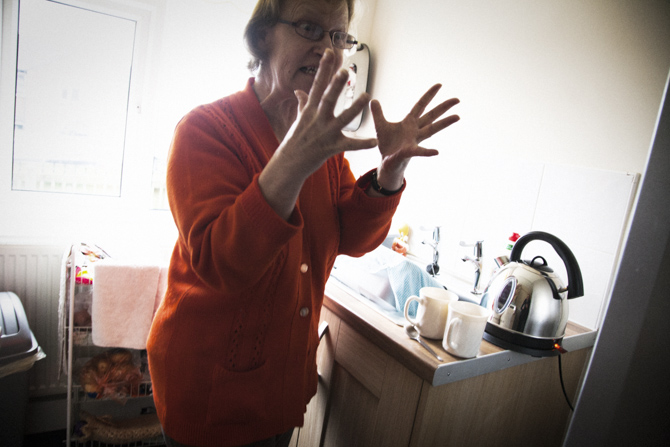
Before we’ve even sat down Lyn has started to tell me her story and can barely contain her rage.
Over the last couple of years she’s been hit by a double whammy of government policy changes that has seen her lose her house and, at age 60, forced her to continue looking for a job she thinks she’ll never, ever get.
Lyn and her husband Tom moved to Bolton nine years ago, at first near the town centre. “We had troublesome neighbours,” she recalls, “but were told we had to stick it out for a year before they would move us. Then we moved to Breightmet, near the UCAN.”
“And what was that house like?”
“We had three bedrooms, a front and back garden. Tom was a joiner and he fitted wardrobes in our bedroom; he revamped the kitchen, made it look much bigger than it actually was. He did lots on that house.
“In fact, Tom was my king and I was his queen and that, to me, was our palace. And this place,” she waves an arm, “this place will never be like that.”
Before Bolton the couple lived in France where Tom had a job inspecting campsites for a travel company. It was a good life. After nearly four years he was made redundant and within months of their return to the UK was diagnosed with cancer.
“Tom died three years ago. We’d met in 1998 and married in 2000 so we had just 13 years together. Before he died we had quite a good income. There was his pension and, because of his illness, he was on DLA [Disability Living Allowance].
“Now I’m on JSA [Jobseeker’s Allowance], £71 a week. It’s gone from this,” she extends her arms, “to this,” pinching a finger and thumb together. “And you think to yourself, how do you manage? But you do, you have to.”
“How much would you have had to pay in ‘bedroom tax’, if you’d stayed in that house?”
“I think it was £19 a week,” she says. “Out of £71.”
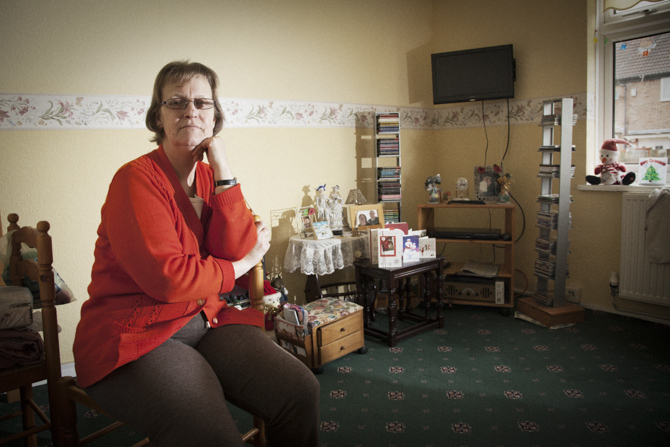
The under-occupancy penalty is a key element of the Government’s welfare reforms and is intended to reign in housing benefit payments. Why should the state pay for claimants to live in a bigger property than they need? Originally introduced into the private housing sector the penalty rolled out to include social housing from April 2013.
By way of balance I start to put the Government’s case for the ‘tax’ to Lyn, “Before you say any more,” she says, “I couldn’t give two hoots what the Government thinks because they are not living in the real world and don’t understand how we live. At the end of the day, it doesn’t matter who is in power and I’ll put it to you crudely,” – she does – “they’re all the same. They will never know what it’s like for us. Even if they left power tomorrow, they are so wealthy and affluent, they could just buy any house they wanted. We can’t.”
… continued in “This will never be my palace”
continued from… A double whammy
Faced with reduced housing benefit, tenants have a choice. Either they opt to adjust their budgets to take into account of the reduction or they move.
Neither option is straightforward. It’s highly unlikely that tenants have any slack in their limited budgets and so many decide to cut back on food or heating so they can stay in their homes. And moving isn’t always possible. Few housing providers have the optimum spread of property types to suit the demographics of all their customers.
I’ve heard Bolton at Home has a glut of perfectly good two-bedroomed flats in their tower blocks. Single people are unwilling to take them on because they’d incur the charge and, quite rightly, families aren’t keen because there’s nowhere for their kids to play.
This controversial charge has hit Lyn hard. It’s not applicable to pensioners and Lyn might have been able to stay in her ‘palace’ had it not been for the recent changes made to retirement ages. A progressive increase in the State Pension Age means that she can only ‘retire’ and start to draw State Pension when she is 63.
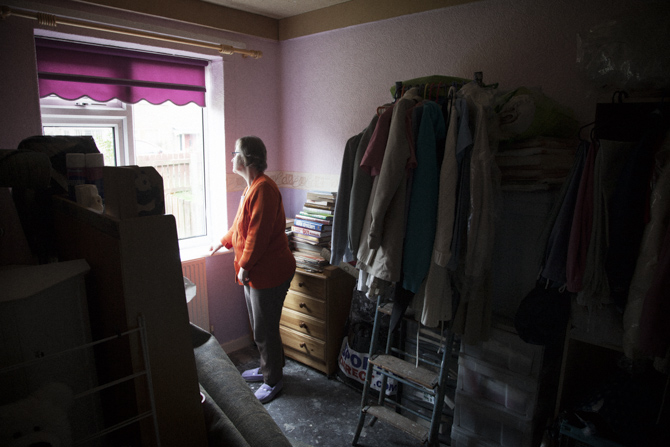
“What was your first reaction when you heard about the bedroom tax?” I ask.
Lyn purses her lips, deciding what to say next. “I was disgusted. I felt angry. I still feel angry. If I had been able to retire when I was 60 then I wouldn’t have had to move. But how could I afford to pay for two bedrooms for another three years?
“I saw this place was available back in February and the housing people told me it’d be ready in six weeks. So I started to pack. Within six weeks I was ready. But it was the end of October before I was able to move.”
“You mean it took seven months rather than six weeks?”
Since she moved five weeks ago Lyn and her friends have decorated the living room and, to save money, she’s brought her carpets from her old house and had them fitted here.
“It’s a lot warmer than the house,” she concedes.
“And is that it’s only saving grace?” I ask. “What do you miss about the old place?”
“Not being there!” she says indignantly. “We had a lot of laughs in that house. Up to the end my husband was always laughing and joking. That’s him there.” She points to a framed picture on a small table.
“And how did you feel on the day you left?” I ask. Lyn purses her lips again. It’s a unnecessary question. I already know the answer.
“Very upset. Very upset.”
Because she is claiming Jobseeker’s Allowance, Lyn has to show each week that she is searching for work or she risks sanctions. She’s been to sessions at the UCAN to learn basic IT so she can browse the Universal JobMatch website.
“Shop work, cashier, care assistant, anything really,” she says when I ask what she’s been searching for. “And I’ve had some interviews but you can tell from the way they look at you that they think you’re too old. Of course they can’t tell you that, but that’s what they’re thinking.”
“Do you think you’ll get a job between now and when you retire?”
“No, I’ve got no chance. I’d like to work but I’m not kidding myself. I think it’s degrading having to look for work at my age. I shouldn’t be doing it.”
No one has moved into Lyn’s old house and she takes the long way round when you goes to the UCAN so she doesn’t have to walk past it. “It still hurts,” she says.
I ask if I can take a picture in the bedroom, maybe of her sitting on the bed.
“That’s my bed,” she says, pointing to the settee I’m on. “The bedroom is packed with my old stuff. I haven’t got room to put the bed up yet, so I’m sleeping in here for now.”
I photograph Lyn in the bedroom anyway.
“I’ll keep it nice,” says Lyn. “But this will never be my palace.”
This was the morning after the first episode of Benefits Street, the now controversial Channel Four documentary following benefit claimants on a single Birmingham street.
“Not one of them, I believe, want to get a job,” says Darren as we sit in the upstairs office. “It was just drink and drugs… skipping through life… it’s not typical of what it’s like on benefits. It’s probably one of the worst streets in Birmingham, but that’s not the point, no matter where you live you can try and find a job.
“No one on that programme were determined enough. They were getting out of bed and it was fag in mouth and can in hand. You just can’t do that.”
Darren is 37 but looks 25. Four years ago he had an operation on his feet and spent the next 18 months in a wheelchair. This month he’s just received the first pay packet he’s had for two years. He’s a UCAN success story and he doesn’t mind who knows.

“When I was out of work I’d get into a routine: every morning I’d come down to the UCAN. It’d get me out of the house, stop me looking at the four walls or watching TV. If you want a job, you have to have the right mindset.
“But that operation took me out for a long time. My self-esteem took a big knock. When someone sits you down and says, ‘It’s going to be difficult for you Darren, you’re going to have to learn to walk again’, then your confidence goes.”
“But you did do it,” I say, “you did learn to walk again.”
“Yeah. Yeah. I’ve done it. I still struggle a bit but if someone saw me on the street I’d just look like anyone else.”
Once recovered Darren got work through an agency as a warehouse order picker which he did for two years. He was then on benefits for a fortnight before he got another job doing the same kind of work. Five months later he was laid off. That was more than two years ago and it was then that he first started to use the UCAN.
“It’s been a tough time. Really tough. I wouldn’t want to do it again but you don’t have a choice, do you? At first I came to the UCAN every other day, then every day. I was unsure, shy really, and they helped me. I told them I wasn’t great on the computer and they put me on the IT course.
“I only had a paper CV – nothing I could email – and they helped me make a proper CV. Now I’ve got different CVs for different jobs and they’re absolutely immaculate, you’re not going to beat them.”
When Darren wasn’t spending time on the Work Programme – a compulsory ‘job club’ for the long term unemployed – he was at the UCAN sending off CVs. “Me, personally, I would be applying for 10 jobs a day. That’s me. That’s my preference.”
“Why? What makes you so motivated?” Daft question.
“Because I want a job. I believe, in my head, if you are determined enough, there’s something out there for everyone.”
“Are there enough jobs for people who want them, do you think?
“It depends what sort of job you want,” he says. “I believe if you aim too high you’ll only be disappointed. You have to be realistic. Believe me, I don’t want national minimum wage but you have to go for it. Anything else is a bonus. You can work your way up.”
Darren has now a job on the help desk of some security company. He receives calls when building alarms are triggered and sends an engineer to investigate. With his first wages he wandered into Currys and bought himself a washing machine.
As we’re talking I imagine what sort of TV programme the documentary team might have made had they followed Darren for the last twelve months. It wouldn’t be very exciting, and certainly wouldn’t make prime time.
There’d be hours of footage of Darren in front of the computer looking for work; shots of him cooking his own fresh food – “I’d rather make something myself than get a takeaway” – and not a single scene of drunken excess because, as he says, “for me, paying the bills is more important than drinking”.
If Benefits Street isn’t typical then maybe super-motivated, healthy-eating Darren isn’t either but there must be plenty of people in between.








